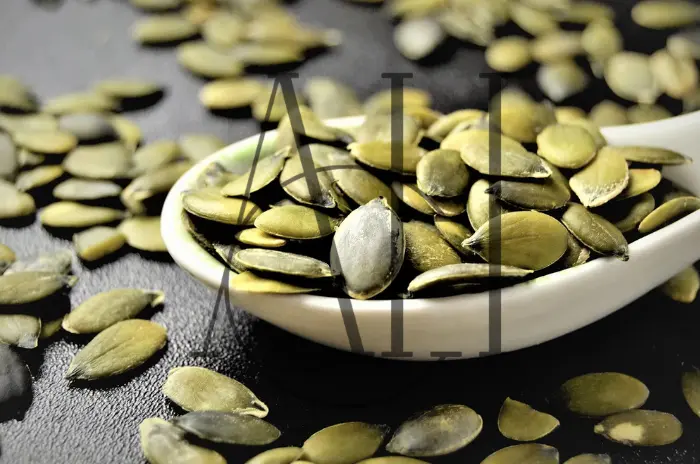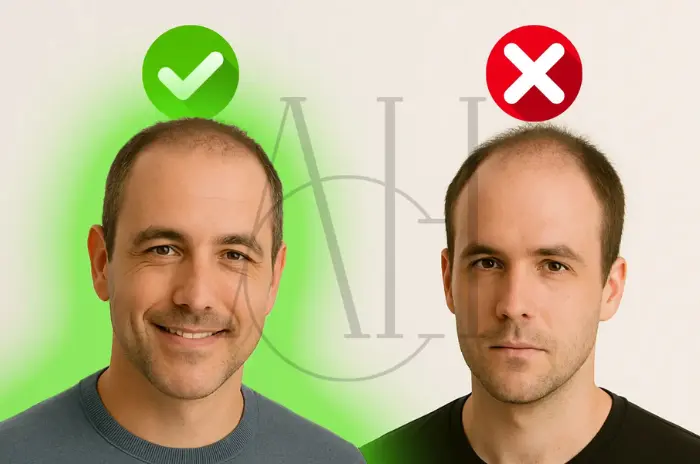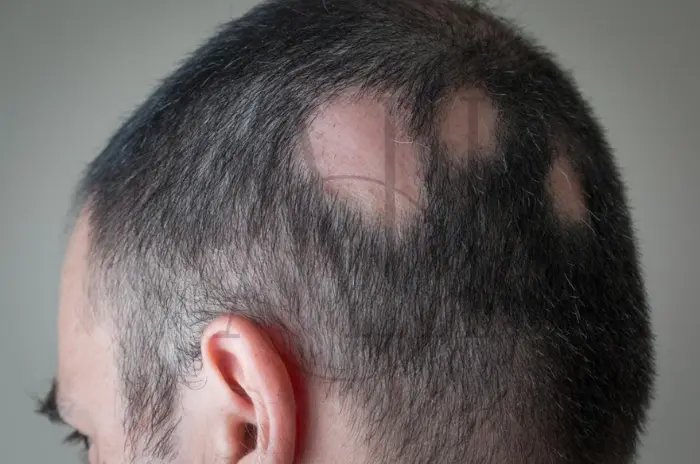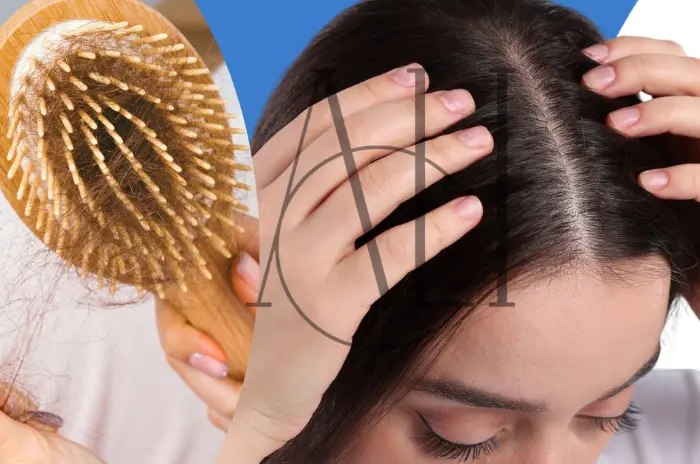Hair loss affects millions of people worldwide, leading many to seek natural, effective solutions. Among the emerging natural remedies, pumpkin seed oil has gained significant attention for its potential to promote hair growth and combat hair loss. At Albania Hair Clinic, we believe in exploring all evidence-based options to help our patients achieve optimal hair health.
Table of Contents
ToggleWhat is Pumpkin Seed Oil?
Pumpkin seed oil is a nutrient-dense natural oil extracted from the seeds of pumpkins (Cucurbita pepo). This distinctive dark green oil has been used for centuries in traditional medicine and culinary applications. The oil is particularly rich in essential fatty acids, vitamins, minerals, and bioactive compounds that contribute to its therapeutic properties.
The extraction process typically involves cold-pressing roasted pumpkin seeds, which helps preserve the oil’s nutritional integrity. High-quality pumpkin seed oil retains its characteristic deep green color and nutty flavor, indicating the presence of beneficial compounds like chlorophyll and carotenoids.
Key Components of Pumpkin Seed Oil:
- Linoleic acid (omega-6 fatty acid)
- Oleic acid (omega-9 fatty acid)
- Vitamin E (tocopherols)
- Zinc and magnesium
- Phytosterols (beta-sitosterol)
- Antioxidants and carotenoids
The Science Behind Pumpkin Seed Oil for Hair Growth
Scientific research has revealed several mechanisms through which pumpkin seed oil may support hair growth and prevent hair loss. Studies have demonstrated that regular use of pumpkin seed oil can lead to measurable improvements in hair density and thickness.
A notable clinical study published in Evidence-Based Complementary and Alternative Medicine showed that men who took 400mg of pumpkin seed oil daily for 24 weeks experienced a 40% increase in hair count compared to the placebo group. The research suggests that pumpkin seed oil works through multiple pathways to support healthy hair growth.
The oil’s effectiveness stems from its ability to address several key factors involved in hair loss, including hormonal imbalances, nutritional deficiencies, and scalp inflammation. Unlike some pharmaceutical treatments, pumpkin seed oil offers a gentle approach with minimal side effects while providing additional health benefits.
What Makes Pumpkin Seed Oil So Effective?
DHT Blocking Properties
Dihydrotestosterone (DHT) is the primary hormone responsible for androgenetic alopecia, the most common form of hair loss in both men and women. DHT causes hair follicles to shrink, leading to progressively thinner hair and eventual hair loss.
Pumpkin seed oil contains powerful phytosterols, particularly beta-sitosterol, that naturally inhibit 5-alpha-reductase. This enzyme converts testosterone into DHT, so by blocking its activity, pumpkin seed oil helps reduce DHT levels in the scalp. This natural DHT-blocking mechanism helps protect hair follicles from miniaturization and maintains healthy hair growth cycles.
Research indicates that pumpkin seed oil’s DHT-blocking properties are comparable to some pharmaceutical treatments but with significantly fewer side effects. The oil provides a natural alternative for individuals seeking to address hormone-related hair loss without the potential complications associated with synthetic DHT blockers.
Nutrient Rich Support
Pumpkin seed oil delivers a comprehensive array of nutrients directly to hair follicles and the scalp. These nutrients work synergistically to create optimal conditions for healthy hair growth:
Zinc plays a crucial role in protein synthesis and cell division, both essential for hair growth. Zinc deficiency is strongly linked to hair loss, making pumpkin seed oil’s high zinc content particularly valuable for hair health.
Essential fatty acids (omega-3 and omega-6) nourish hair follicles, improve scalp circulation, and help maintain the hair’s natural moisture barrier. These fatty acids also support the production of sebum, the scalp’s natural protective oil.
Vitamin E acts as a powerful antioxidant, protecting hair follicles from oxidative stress and free radical damage. This protection helps maintain healthy follicle function and prevents premature hair aging.
Pumpkin Seed Benefits for Hair
Boosts Shine
Pumpkin seed oil’s rich fatty acid content helps smooth the hair cuticle, creating a reflective surface that enhances natural shine. The oil’s emollient properties seal moisture into the hair shaft, resulting in healthier-looking, more lustrous hair. Regular application can transform dull, lifeless hair into vibrant, glossy locks.
Change Hair Colour
While not a traditional hair dye, pumpkin seed oil can subtly enhance and deepen natural hair color. The oil’s nourishing properties help restore the hair’s natural pigmentation by improving overall hair health. Users often report that their natural hair color appears richer and more vibrant after consistent use of pumpkin seed oil.
Thicken Hair
Pumpkin seed oil promotes hair thickness through multiple mechanisms. By improving follicle health and reducing DHT-related damage, the oil helps existing hair grow stronger and fuller. Additionally, the oil’s nutrient profile supports the growth of new, healthy hair strands, contributing to overall hair density and volume.
Reduce the Signs of Damage
The antioxidants and essential fatty acids in pumpkin seed oil help repair existing hair damage and prevent future deterioration. The oil can help restore elasticity to brittle hair, reduce split ends, and improve overall hair texture. Regular use helps create a protective barrier against environmental stressors that contribute to hair damage.
Prevent and Stop Hair Loss
Through its DHT-blocking properties and comprehensive nutritional support, pumpkin seed oil addresses multiple causes of hair loss. The oil helps extend the hair growth phase (anagen) while reducing the hair shedding phase (telogen). This dual action results in less hair loss and improved hair retention over time.
Women’s Hair Loss
Women experiencing hair loss due to hormonal changes, stress, or nutritional deficiencies can particularly benefit from pumpkin seed oil. The oil’s gentle hormonal balancing effects make it especially suitable for women dealing with postpartum hair loss, menopause-related thinning, or PCOS-associated hair issues.
Locks in Moisture
Pumpkin seed oil creates an effective moisture barrier that prevents water loss from the hair shaft and scalp. This moisture-locking property is particularly beneficial for individuals with dry, brittle hair or those living in harsh environmental conditions. The oil helps maintain optimal hydration levels for healthy hair growth.
Reduces Oxidative Stress and Inflammation
The high concentration of antioxidants in pumpkin seed oil helps combat oxidative stress in hair follicles and scalp tissue. By reducing inflammation and neutralizing free radicals, the oil creates a healthier environment for hair growth. This anti-inflammatory action also helps soothe irritated scalps and reduce conditions like dandruff.
Keep Your Scalp Healthy
A healthy scalp is fundamental to healthy hair growth. Pumpkin seed oil’s antimicrobial and anti-inflammatory properties help maintain optimal scalp conditions. The oil helps balance scalp pH, reduce excessive oiliness or dryness, and prevent common scalp issues that can interfere with hair growth.
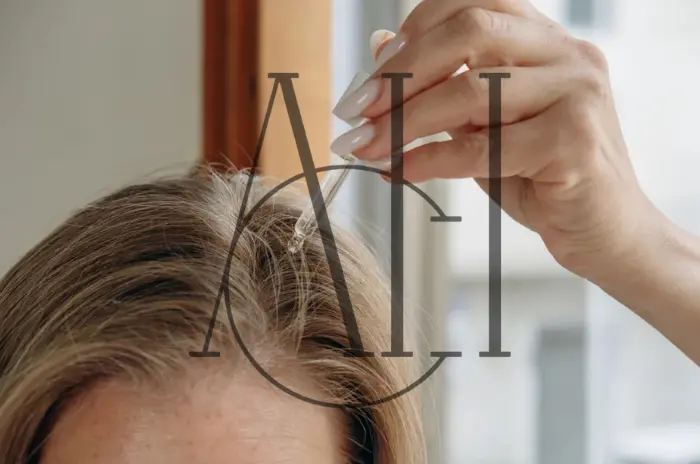
Does Pumpkin Seed Oil Help Hair Loss?
Clinical evidence strongly suggests that pumpkin seed oil can be effective in treating various forms of hair loss. Multiple studies have demonstrated significant improvements in hair count, thickness, and overall hair health among users of pumpkin seed oil supplements and topical applications.
|
Study Parameter |
Improvement After 24 Weeks |
Clinical Significance |
|
Hair Count |
40% increase |
Statistically significant |
|
Hair Thickness |
30% improvement |
Clinically meaningful |
|
Patient Satisfaction |
76% reported improvement |
High satisfaction rate |
|
Side Effects |
<3% experienced mild effects |
Excellent safety profile |
The effectiveness of pumpkin seed oil appears to be most pronounced in cases of mild to moderate hair loss, particularly androgenetic alopecia. While results may vary among individuals, the majority of users report noticeable improvements within 3-6 months of consistent use.
How Pumpkin Seed Works
Pumpkin seed oil works through a multi-faceted approach to hair health:
Hormonal Regulation: The oil’s phytosterols help balance hormone levels by reducing DHT production, protecting hair follicles from hormone-related damage.
Nutritional Support: Essential nutrients are delivered directly to hair follicles, providing the building blocks necessary for healthy hair growth.
Improved Circulation: The oil’s components help enhance blood flow to the scalp, ensuring that hair follicles receive adequate oxygen and nutrients.
Anti-inflammatory Action: By reducing scalp inflammation, pumpkin seed oil creates optimal conditions for hair follicle function and growth.
Antioxidant Protection: The oil’s antioxidants protect hair follicles from environmental damage and aging, maintaining their ability to produce healthy hair.
Is Pumpkin Seed Oil Right for Your Hair Loss?
Pumpkin seed oil may be an excellent choice for individuals experiencing:
- Early-stage hair thinning or loss
- Hormone-related hair loss (androgenetic alopecia)
- Dry, damaged, or brittle hair
- Scalp irritation or inflammation
- Hair loss due to nutritional deficiencies
Ideal Candidates:
- Men and women with mild to moderate hair loss
- Individuals seeking natural alternatives to pharmaceutical treatments
- People who want to complement existing hair loss treatments
- Those with sensitive scalps who cannot tolerate harsh treatments
The oil is particularly well-suited for individuals who prefer natural approaches and want to avoid the potential side effects associated with pharmaceutical hair loss treatments.
Who Would Benefit from Using Pumpkin Seed Oil?
Primary Beneficiaries:
- Men experiencing male pattern baldness in early stages
- Women with female pattern hair loss or diffuse thinning
- Postpartum women dealing with temporary hair loss
- Individuals with hormone-related hair issues
- People with dry, damaged, or over-processed hair
Secondary Benefits For:
- Those with scalp conditions like dandruff or seborrheic dermatitis
- Individuals experiencing stress-related hair loss
- People seeking overall hair health improvement
- Anyone wanting to prevent future hair loss
The Science Behind Pumpkin Seed Oil for Hair Loss
Recent scientific research has provided compelling evidence for pumpkin seed oil’s effectiveness in treating hair loss. The oil’s mechanism of action involves several key pathways:
5-Alpha-Reductase Inhibition: Studies have shown that pumpkin seed oil significantly reduces the activity of 5-alpha-reductase, the enzyme responsible for converting testosterone to DHT. This reduction in DHT levels helps protect hair follicles from hormone-related damage.
Growth Factor Stimulation: Research indicates that pumpkin seed oil may stimulate the production of growth factors that promote hair follicle regeneration and hair shaft development.
Cell Proliferation: The oil’s nutrients support increased cell division in hair follicles, leading to stronger, healthier hair growth.
Vascular Effects: Some studies suggest that pumpkin seed oil may improve blood circulation to the scalp, enhancing nutrient delivery to hair follicles.
How to Use Pumpkin Seed Oil for Hair
Dietary Integration
Incorporating pumpkin seed oil into your diet provides systemic benefits for hair health. The oil can be consumed in various ways:
- Salad dressing: Add 1-2 tablespoons to salads or cold dishes
- Smoothies: Blend 1 tablespoon into fruit or vegetable smoothies
- Direct consumption: Take 1-2 tablespoons daily on an empty stomach
Important Notes:
- Use only cold-pressed, unrefined pumpkin seed oil for maximum benefits
- Avoid heating the oil as high temperatures can destroy beneficial compounds
- Start with smaller amounts and gradually increase to assess tolerance
Oral Supplements
Pumpkin seed oil supplements offer a convenient way to ensure consistent daily intake:
Dosage Guidelines:
- Standard dose: 1000-2000mg daily
- Timing: Take with meals to improve absorption
- Duration: Continue for at least 24 weeks for optimal results
Selection Criteria:
- Choose supplements from reputable manufacturers
- Look for standardized extracts with verified potency
- Ensure third-party testing for purity and quality
Always consult with a healthcare provider before starting any supplement regimen, especially if you have existing health conditions or take medications.
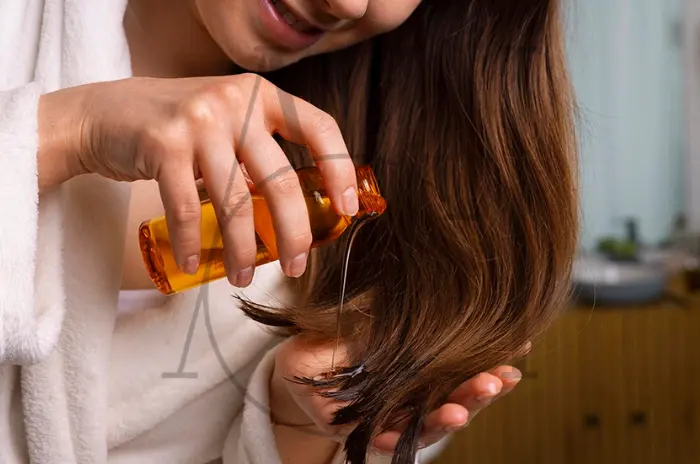
Topical Pumpkin Seed Oil
Direct application to the scalp provides targeted benefits:
Application Method:
- Warm 2-3 tablespoons of oil to body temperature
- Part hair into sections and apply oil directly to scalp
- Massage gently using circular motions for 5-10 minutes
- Work remaining oil through hair length
- Leave on for 30 minutes to overnight
- Shampoo thoroughly with gentle cleanser
Treatment Frequency:
- 2-3 times per week for maintenance
- Daily application for intensive treatment
- Adjust frequency based on scalp sensitivity and hair type
Other Effects of Pumpkin Seed
Prostate Health
Pumpkin seed oil has been extensively studied for its benefits in supporting prostate health. The oil’s phytosterols and zinc content help reduce symptoms of benign prostatic hyperplasia (BPH) and support overall prostate function. Regular consumption may help improve urinary flow and reduce nighttime urination.
Heart Health
The oil’s beneficial fatty acid profile supports cardiovascular health by helping to maintain healthy cholesterol levels. The phytosterols in pumpkin seed oil can help reduce LDL (bad) cholesterol while supporting HDL (good) cholesterol levels. Additionally, the oil’s anti-inflammatory properties contribute to overall cardiovascular wellness.
Skin
Pumpkin seed oil’s moisturizing and anti-inflammatory properties make it excellent for skin health. The oil can help soothe conditions like eczema, dermatitis, and dry skin. Its antioxidant content also supports skin regeneration and may help reduce signs of aging.
Mental Health
The oil contains tryptophan, an amino acid that supports serotonin production in the brain. This can contribute to improved mood, better sleep quality, and reduced anxiety. Some studies suggest that regular consumption of pumpkin seed oil may help support overall mental well-being.
Urinary Health
Traditional medicine has long recognized pumpkin seed oil’s benefits for urinary tract health. The oil may help support bladder function and reduce symptoms of overactive bladder. Its anti-inflammatory properties can also help soothe urinary tract irritation.
Menopause
Women experiencing menopause may find pumpkin seed oil helpful for managing various symptoms. The oil’s phytoestrogens can help balance hormone levels, potentially reducing hot flashes, mood swings, and hair loss associated with menopause. The oil’s overall nutritional support also helps maintain bone health during this transitional period.
Risks and Side Effects of Pumpkin Seed Oil
While pumpkin seed oil is generally well-tolerated, some individuals may experience side effects:
Diarrhoea
Consuming large amounts of pumpkin seed oil may cause loose stools or diarrhea, particularly when first introducing the oil to your diet. This typically occurs with doses exceeding recommended amounts or when consuming the oil on an empty stomach.
Prevention strategies:
- Start with smaller doses and gradually increase
- Take with food to improve tolerance
- Ensure adequate hydration
Nausea
Some people may experience nausea, especially when taking concentrated supplements or consuming large amounts of oil. This side effect is more common when the oil is taken without food.
Management approaches:
- Take supplements with meals
- Reduce dosage if nausea persists
- Consider dividing daily dose into smaller portions
Allergic Reactions
Individuals with allergies to seeds, nuts, or members of the Cucurbitaceae family (squash, pumpkins, melons) should exercise caution. Allergic reactions may include skin rash, itching, swelling, or respiratory symptoms.
Safety measures:
- Perform patch test before first use
- Start with very small amounts
- Discontinue use if any allergic symptoms occur
Stomach Ache
Digestive discomfort may occur, particularly in individuals with sensitive stomachs or those consuming excessive amounts. This may manifest as stomach pain, cramping, or general digestive upset.
Prevention tips:
- Take with food to reduce stomach irritation
- Stay within recommended dosages
- Consider taking digestive enzymes if needed
Combining Pumpkin Seed Oil with Professional Hair Loss Treatments
Low-Level Laser Therapy (LLLT)
Combining pumpkin seed oil with LLLT can enhance treatment outcomes through complementary mechanisms:
Synergistic Benefits:
- LLLT stimulates cellular activity while pumpkin seed oil provides nutritional support
- The oil’s anti-inflammatory properties may enhance laser therapy effectiveness
- Combined treatment may accelerate hair growth compared to either treatment alone
Application Protocol:
- Apply pumpkin seed oil to scalp 30 minutes before LLLT sessions
- Use oil as post-treatment care to soothe the scalp
- Maintain consistent oil application between laser sessions
Platelet-Rich Plasma (PRP) Therapy
Platelet-Rich Plasma (PRP) therapy combined with pumpkin seed oil can provide comprehensive hair restoration benefits:
Complementary Actions:
- PRP stimulates growth factors while oil blocks DHT
- Oil’s nutrients support the healing process post-PRP
- Anti-inflammatory properties help reduce post-treatment discomfort
Integration Approach:
- Use pumpkin seed oil as pre-treatment scalp preparation
- Apply oil between PRP sessions to maintain scalp health
- Continue oil therapy for sustained DHT blocking effects
|
Treatment Combination |
Primary Benefit |
Expected Timeline |
Success Rate |
|
Oil + LLLT |
Enhanced follicle stimulation |
3-6 months |
75-85% |
|
Oil + PRP |
Comprehensive regeneration |
4-8 months |
80-90% |
|
Oil + Microneedling |
Improved absorption |
2-4 months |
70-80% |
Pumpkin Seed Oil and Minoxidil: What’s the Link?
The combination of pumpkin seed oil and minoxidil represents a powerful approach to hair loss treatment. While minoxidil works as a vasodilator to improve blood flow to hair follicles, pumpkin seed oil addresses the hormonal component of hair loss through DHT blocking.
Complementary Mechanisms:
- Minoxidil increases blood circulation to follicles
- Pumpkin seed oil blocks DHT production
- Combined approach addresses multiple causes of hair loss
- Reduced side effects from lower minoxidil concentrations
Application Strategy:
- Apply pumpkin seed oil in the morning
- Use minoxidil in the evening
- Allow adequate absorption time between applications
- Monitor scalp response and adjust frequency as needed
Many patients find that combining these treatments allows for better results with potentially fewer side effects than using minoxidil alone at higher concentrations.
Struggling with Hair Loss?
Hair loss can be emotionally challenging and impact self-confidence significantly. If you’re experiencing hair thinning, excessive shedding, or pattern baldness, you’re not alone. Millions of people worldwide face similar challenges, and effective solutions are available.
Early intervention is key to achieving the best possible outcomes in hair loss treatment. The sooner you address hair loss, the more options you have and the better your chances of preserving and restoring your hair.
Signs to watch for:
- Increased hair in the shower drain or on your pillow
- Visible thinning at the crown or temples
- Widening part line or receding hairline
- Changes in hair texture or growth rate
If you notice any of these signs, consider starting with natural approaches like pumpkin seed oil while exploring other treatment options with qualified professionals.
What About a Hair Transplant?
For individuals with advanced hair loss or those who haven’t achieved desired results with non-surgical treatments, hair transplantation may be an appropriate option. Modern hair transplant techniques, such as FUE (Follicular Unit Extraction) and FUT (Follicular Unit Transplantation), can provide natural-looking, permanent results.
When to consider hair transplantation:
- Significant hair loss with adequate donor hair available
- Stable hair loss pattern for at least 12 months
- Realistic expectations about outcomes
- Good overall health and healing capacity
At Albania Hair Clinic, our experienced intermediary organization can evaluate your specific situation and recommend the most appropriate treatment approach. Whether that involves natural treatments like pumpkin seed oil, advanced non-surgical therapies, or surgical restoration, we’re committed to helping you achieve your hair restoration goals.
Combining approaches often yields the best results. Many patients use pumpkin seed oil as part of their post-transplant care regimen to support healing and maintain the health of both transplanted and existing hair.
FAQ :
What is pumpkin seed oil, and how does it benefit hair growth?
Pumpkin seed oil is a natural oil extracted from pumpkin seeds containing essential fatty acids, vitamins, and phytosterols. It benefits hair growth by blocking DHT (the hormone causing hair loss), nourishing hair follicles, and reducing scalp inflammation.
Does pumpkin seed oil help with hair loss?
Yes, clinical studies show pumpkin seed oil can be effective for hair loss. Research demonstrates up to 40% increase in hair count after 24 weeks of use. It’s most effective for androgenetic alopecia by blocking DHT production.
How does pumpkin seed oil block DHT?
Pumpkin seed oil contains phytosterols that inhibit 5-alpha-reductase, the enzyme converting testosterone to DHT. By blocking this enzyme, it naturally reduces DHT levels in the scalp, protecting hair follicles from damage.
Is pumpkin seed oil effective for both men and women?
Yes, it’s effective for both men and women. Men benefit from DHT blocking for pattern baldness, while women can use it for hormone-related hair loss during menopause, postpartum, or with PCOS.
What are the side effects of using pumpkin seed oil for hair?
Side effects are minimal and may include mild digestive issues (diarrhea, nausea) when consumed in large amounts, or rare allergic reactions in those sensitive to seeds. Topical use rarely causes side effects.
How should I use pumpkin seed oil for hair growth?
Use it three ways: dietary (1-2 tablespoons daily), supplements (1000-2000mg daily), or topical application (massage into scalp 2-3 times weekly). Combine methods for best results and maintain consistency for 24 weeks.
Can pumpkin seed oil be combined with other hair loss treatments?
Yes, it combines well with minoxidil, LLLT, PRP therapy, and post-transplant care. Its natural DHT-blocking properties complement other treatments and may enhance effectiveness while reducing side effects.
How long does it take to see results from using pumpkin seed oil?
Initial improvements in hair quality appear within 4-8 weeks. Significant changes in hair count and thickness become visible after 12-24 weeks. Maximum benefits typically occur after 6 months of consistent use.

